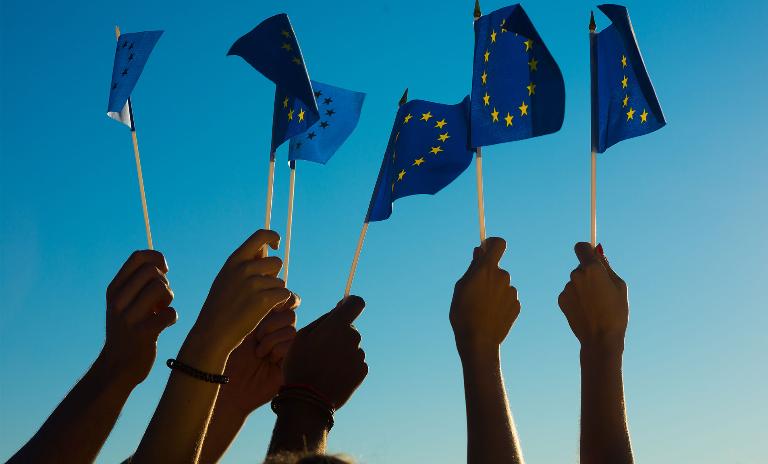

Five proposals for Europe 4.0
- How the European Union can bravely grasp the opportunities of digitization and use the Juncker plan as a catalyst for strategic digital investments.
"Five policy proposals for the EU to grasp Europe's opportunities of digitization."
Europe and the EU must gear up for the challenges of a new era. We need Europe 4.0! The five proposals below indicate how the EU can move on from the tiresome Grexit and Brexit debate and how it can at the same time master the digital transformation.
First, Europe needs a new balance of power
Europe needs a new balance of power – and with it a new understanding of collaboration. Against the backdrop of the economic rise of the Eastern accession states and the drifting apart of North and South, the power relations in the EU need to be rebalanced. Germany and France will keep their leading role but it will have to change: shared leadership to replace paternalism.
The proposal made by the top executives of the five EU institutions to create a genuine economic and currency union with a treasury at its head is a move in the right direction. The proposed fiscal committee could help raise Europe’s competitiveness, interlink budget policy more closely and support necessary reforms in all countries, rendering a second Greek scenario impossible.
As we have seen happen in the net economy, so too is European politics going to see even greater interdependencies arise between the various actors. Nations will not be able to solve the continent’s problems single-handedly, collaboration in a spirit of trust and on an equal footing is the order of the day.
The basic principle of the new Europe must be: less lecturing each other and more working together on collaborative initiatives that really point the way forward, such as developing and implementing the Juncker plan for the big topics of the future and genuinely reforming the social security systems.

Second, the EU needs more flexibility regarding digital challenges
The EU must respond faster and with a greater measure of flexibility to the challenges of the digital world. The biggest obstacle in its path is the overwhelming scale of bureaucracy. Most of the laws that apply in the Member States today originate out of Brussels. In spite of the efforts made toward deregulation, the scale of the EU’s anti-competitive red tape is shocking. What we need is the “one in, one out” principle: for every new rule that comes in, an old one should be thrown out!
“Framing rather than micromanaging” is thus what the principle of modern governance should look like. We need more dialog, more transparency, more of an all-round approach. The digital economy shows the way: reducing interfaces and picking up on new customer needs are two of its strengths. If we had a situation where the EU institutions felt totally committed to the nations’ citizens as their customers, Europe would gain enormously.
The good news is that digitization is going to force European institutions to become more transparent. Explaining things and convincing people is exactly what needs to be done in a connected society clamouring for greater participation.
Third, Europe needs to develop digital champions
Europe must push forward with big, courageous projects on the issues of the future if it is to build up momentum as an economic area and have an integrating effect. Digital success stories from a range of companies show how it’s done – how it’s possible to develop new business lines given the right measure of ambition and a shot of audacity.
The issue at the very top of the agenda is the finalization of the single market. Why does Europe have more than 50 mobile phone networks, whereas the US has just five? Cross-border consolidation would create economies of scale – to the benefit of companies and customers alike.
Further, Europe needs to develop digital champions. Currently, the 28 Member States boast barely any leading companies from the digital sphere. There is not one European player among the twenty biggest Internet companies in the world. The growth potential of comprehensive digitization must not go to waste, having been estimated by Roland Berger in conjunction with the BDI to amount to a cumulative EUR 1.25 trillion in additional gross value added for the period through 2025.

Fourth, Europe needs more entrepreneurial spirit
Europe needs more innovations, more entrepreneurial spirit and more connectivity. R&D budgets need to be increased, in both the private and the public sector, and investment needs to be encouraged with tax benefits.
More startups and more venture capital is an important step to establishing new business models. At least failing in business seems to be becoming less of a taboo in Europe, and not only Silicon Valley but also cities like Berlin and Dublin are attracting ever more startup entrepreneurs and venture capital.
Importantly, Europe needs more clusters where established businesses and startups can work together and weave networks. In the US, these are important drivers of innovation. So we urgently need some European Digital Valleys: virtual platforms upon which companies, experts and institutes can develop and realize collaborative projects. There is no lack of good ideas. But we need the right mindset and an environment conducive to growth in order to help good ideas break through into the market.
Fifth, private sector investments have to become easier
The aim of this paradigm shift, as the fifth point, is to get the transformation from a savings (Germany) or consumption (Greece) culture to an investment culture embedded in the heads of the population. The Southern European nations are not the only ones who need to get their house in order: Germany’s net investment ratio has fallen by 75% (in nominal terms) since 1999.
Instead of the debate over austerity or deficit spending, what we need to give is a halt to unnecessary spending on bureaucracy and subsidies and a go-ahead for spending on infrastructure and the knowledge society, which will have an effect on productivity. We need to have a framework that is reliable and free of ideologies to make private sector investments easier. As a Roland Berger analysis demonstrated, an additional EUR 80 billion per year of EU investment in central infrastructure projects would lead to 1% higher growth.
Targeted investments in digital infrastructure would send a signal and have a knock-on effect. Why not reserve for this purpose the majority of the EUR 21 billion in public funds envisaged by the Juncker plan as a catalyst for the EUR 315 billion in private sector financing of strategic investments?

...then Europe 4.0 will be a model of success
In short, what Europe needs to do is not only to demand budget discipline from struggling EU nations, but also to get all of the countries to join together and make a major effort to pave the way for real structural reform. Europe faces great challenges – and it needs to think different, organize itself better and act in harmony.
It needs to close ranks instead of drift apart, it needs to make use of the strengths it has, and it needs to bravely grasp the opportunities of digitization. Then Europe 4.0 will be a model of success.
- Photo Credits: Denisfilm / iStockphoto; xijian / iStockphoto; Xavier Arnau / iStockphoto

